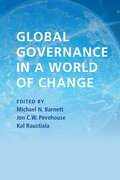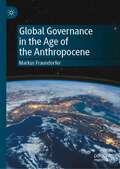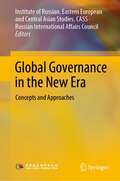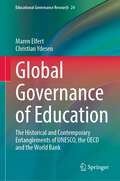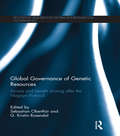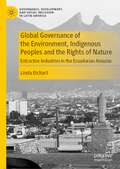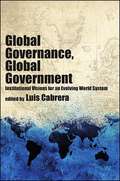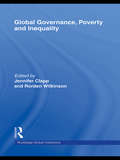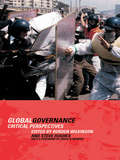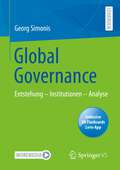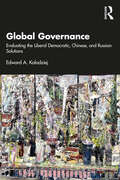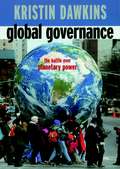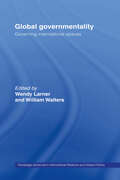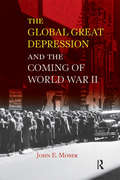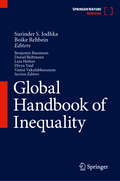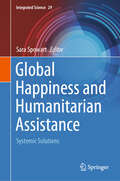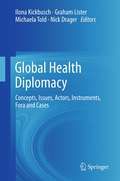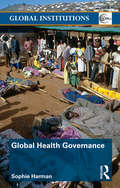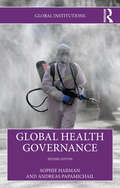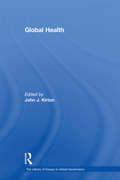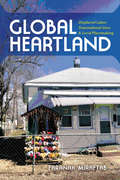- Table View
- List View
Global Governance in a World of Change
by Michael N. Barnett Pevehouse, Jon C.W. Kal RaustialaGlobal governance has come under increasing pressure since the end of the Cold War. In some issue areas, these pressures have led to significant changes in the architecture of governance institutions. In others, institutions have resisted pressures for change. This volume explores what accounts for this divergence in architecture by identifying three modes of governance: hierarchies, networks, and markets. The authors apply these ideal types to different issue areas in order to assess how global governance has changed and why. In most issue areas, hierarchical modes of governance, established after World War II, have given way to alternative forms of organization focused on market or network-based architectures. Each chapter explores whether these changes are likely to lead to more or less effective global governance across a wide range of issue areas. This provides a novel and coherent theoretical framework for analysing change in global governance.
Global Governance in the Age of the Anthropocene
by Markus FraundorferWhy has global governance largely failed to effectively tackle some of the most pressing global environmental challenges of our time? What are the obstacles to effective global and planetary problem-solving? And which solutions and responses have global governance actors come up with to confront these challenges? This textbook teases out the tragic entanglements between dominant global governance dynamics and the global environmental challenges of the Anthropocene, showing how international and global cooperation mechanisms that evolved over the last two hundred years are deeply implicated in exacerbating many of today’s global environmental challenges. The book focuses on several global environmental challenges which are intrinsically interconnected, threatening to destabilise the entire Earth-system with serious consequences for human societies across the world. These global environmental challenges include infectious disease outbreaks, global food production processes, the pollution of freshwater resources, energy consumption patterns, deforestation and CO2 emissions. At the same time, the book also presents several alternative governance examples based on more democratic, citizen-based and holistic approaches to the global climate crisis, which point the way towards a new understanding of global governance in the age of the Anthropocene. This textbook is for undergraduate and postgraduate students of global governance, environmental politics and international relations.
Global Governance in the New Era: Concepts and Approaches
by Institute of Russian, Eastern European and Central Asian Studies, CASS Russian International Affairs CouncilThis book mainly introduces the concepts and approaches of global governance from the viewpoints of Chinese and Russian scholars and is divided into four parts. The first one deals with the concept of a new type of global governance, namely “Globalization 2.0”. The second one is dedicated to institutions and multilateralism, including the importance and effectiveness of international institutions. The third part focuses on the important countries and regions in the new era, as well as such issues as the current global status quo, processes in Eurasia, the prospects of the U.S. – China – Russia trilateral relationship. The last part analyzes the future development of global governance and possible solutions of how it might be improved. Climate change, digital era, cyber security, financial and economic regimes, COVID-19 are all involved in this part. In short, this book is a profound and cutting-edge research on global governance.
Global Governance of Education: The Historical and Contemporary Entanglements of UNESCO, the OECD and the World Bank (Educational Governance Research #24)
by Maren Elfert Christian YdesenThis book examines the educational role of three international organizations created as part of the post-World War II multilateral architecture: the United Nations Educational, Scientific and Cultural Organization (UNESCO), the World Bank, and the Organisation for Economic Co-operation and Development (OECD). These organizations have significantly promoted and shaped education as a fundamental feature of the modernization of society and contributed to the globalization of educational norms, policies and technologies. Drawing on primary source materials and interviews, the book provides novel perspectives to the literature on the global governance of education by focusing on the historical entanglements, relations and power struggles between these three organizations, rather than treating them separately. The study sheds light on the homogenizing effects of globalized educational policy-making and the shifting power dynamics in the global governance of education.‘This book makes a very distinctive and important contribution to the literature that critically analyses the influence of the global agencies on education globally; it goes beyond the standard discursive analyses of policy texts to also explore the history of those organisations through archival research and in-depth interviews of the key personnel. What emerges is a powerful analysis which locates those agencies within their historical epochs and shines a light on their tensions and micro-politics, both internally and between organisations.’ Paul Morris, Professor of Comparative Education, Institute of Education, University College London, UK‘A must-read historical account of the intermingling, boundary setting and competition between the three big intergovernmental organizations (IOs) in education: OECD, UNESCO, and the World Bank. Different from other scholars that document how these IOs have transformed themselves in response to external and internal changes, Elfert and Ydesen draw attention to the relational aspect: how have these three IOs navigated conflict, carved niches, and used and abused each other to amplify and expand their own mission? How have they done so in an environment that is crowded with intergovernmental and international organizations, each with a claim to govern education globally?’Gita Steiner-Khamsi, Professor of Comparative and International Education, Teachers College, Columbia University; UNESCO Chair of Comparative Education Policy of the Geneva Graduate Institute of International and Development Studies'This volume is a thoughtful and timely work of scholarship. Understanding the roles of UNESCO, the OECD and the World Bank is central to understanding contemporary education in global perspective. Elfert and Ydesen’s historical analysis sets out in rigorous detail how these organisations have evolved, and what has shaped and driven this evolution. The historical analysis is complemented by contemporary interview data, facilitating an actor-level analysis as well as a broader picture. The book is conceptually and theoretically rich while being accessibly written; the authors manage complexity remarkably well. For anyone interested in global governance and the role of international organisations, or anyone who wants to understand in general how global educational agendas have developed and converged, this book is a most valuable read.' Michele Schweisfurth, Professor of Comparative and International Education, University of Glasgow, UKChapter "UNESCO, the OECD and the World Bank: A Global Governance Perspective” is available open access under a Creative Commons Attribution 4.0 International License via link.springer.com.
Global Governance of Genetic Resources: Access and Benefit Sharing after the Nagoya Protocol (Routledge Research in Global Environmental Governance)
by Sebastian Oberthür G. Kristin RosendalThis book analyses the status and prospects of the global governance of Access Benefit Sharing (ABS) in the aftermath of 2010’s Nagoya Protocol to the Convention on Biological Diversity (CBD). The CBD’s initial 1992 framework of global ABS governance established the objective of sharing the benefits arising from the use of genetic resources fairly between countries and communities. Since then, ABS has been a contested issue in international politics – not least due to the failure of effective implementation of the original CBD framework. The Nagoya Protocol therefore aims to improve and enhance this framework. Compared to the slow rate of progress on climate change, it has been considered a major achievement of global environmental governance, but it has also been coined a ‘masterpiece of ambiguity’. This book analyses the role of a variety of actors in the emergence of the Nagoya Protocol and provides an up-to-date assessment of the core features of the architecture of global ABS governance. This book offers a central resource regarding ABS governance for those working on and interested in global environmental governance. This is achieved by focusing on two broad themes of the wider research agenda on global environmental governance, namely architecture and agency. Furthermore, individual chapter contributions relate and link ABS governance to other prominent debates in the field, such as institutional complexes, compliance, market-based approaches, EU leadership, the role of small states, the role of non-state actors and more. Partly due to its seeming technical complexity, ABS governance has so far not been at the centre of attention of scholars and practitioners of global environmental governance. In this book, care is taken to provide an accessible account of key functional features of the governance system which enables non-specialists to gain a grasp on the main issues involved, allowing the issue of ABS governance to move centre-stage and be more fully recognised in discussions on global environmental governance.
Global Governance of the Environment, Indigenous Peoples and the Rights of Nature: Extractive Industries in the Ecuadorian Amazon (Governance, Development, and Social Inclusion in Latin America)
by Linda EtchartThis book explores the obstacles facing indigenous communities, non-governmental organizations, governments, and international institutions in their attempts to protect the cultures of indigenous peoples and the world’s remaining rainforests.Indigenous peoples are essential as guardians of the world’s wild places for the maintenance of ecosystems and the prevention of climate change. The Amazonian/Andean indigenous philosophies of sumac kawsay/suma qamaña (buen vivir) were the inspiration for the incorporation of the Rights of Nature into the Ecuadorian and Bolivian constitutions of 2008 and 2009. Yet despite the creation of the United Nations Permanent Forum on Indigenous Issues (2000), and the adoption of the United Nations Declaration on the Rights of Indigenous Peoples (2007), indigenous peoples have been marginalized from intergovernmental environmental negotiations. Indigenous environment protectors’ lives are in danger while the Amazon rainforests continue to burn.By the third decade of the 21st century, the dawn of “woke” capitalism was accompanied by the expansion of ethical investment, with BlackRock leading the field in the “greening” of investment management, while Big Oil sought a career change in sustainable energy production. The final chapters explain the confluence of forces that has resulted in the continued expansion of the extractive frontier into indigenous territory in the Amazon, including areas occupied by peoples living in voluntary isolation.Among these forces are legal and extracurricular payments made to individuals, within indigenous communities and in state entities, and the use of tax havens to deposit unofficial payments made to secure public contracts. Solutions to loss of biodiversity and climate change may be found as much in the transformation of global financial and tax systems in terms of transparency and accountability, as in efforts by states, intergovernmental institutions and private foundations to protect wild areas through the designation of national parks, through climate finance, and other “sustainable” investment strategies.
Global Governance, Global Government: Institutional Visions for an Evolving World System
by Luis CabreraRecent years have seen a remarkable resurgence in rigorous thought on global government by leading thinkers in international relations, economics, and political theory. Not since the immediate post-World War II period have so many scholars given serious attention to possibilities for global political integration.This book will be of interest to students of international relations, political theory, international economics, secuity and gender studies. It pulls together some of the leading current thinkers on global government into a conversation about provocative global institutional visions. Chapters here explore whether a world state should be viewed as inevitable, ways in which global moral and political communities might be sustained, and reasons to reject world government in favor of improvements to governance in the United Nations and other institutions.
Global Governance, Poverty and Inequality (Global Institutions)
by Jennifer ClappA series of crises unfolded in the latter part of the first decade of the 21st Century which combined to exacerbate already profound conditions of global economic inequality and poverty in the world’s poorest countries. In 2007, the unsound lending practices that caused a collapse in the US housing market ushered in a broader economic crisis that reverberated throughout the global financial system. This economic shockwave had a global impact, triggering not just instability in other industrialized countries, but also in their developing world counterparts, also highlighting deficiencies in the current structures of global governance to protect the world’s poorest and most disadvantaged. This book offers answers to questions raised about the role of global governance in the attenuation and amelioration of world poverty and inequality. The contributors interrogate the role of systems of governance at a time of global economic crisis and continuing environmental degradation against a backdrop of acceleration in inequalities within and between communities and across the globe. Evaluating how existing systems can be reformed or redesigned to be more effective at addressing issues of poverty and inequality and providing a comprehensive discussion of a wide range of global governance initiatives this work will be essential reading for students and scholars of global governance, international relations and international organizations.
Global Governance: Critical Perspectives
by Steve Hughes Rorden WilkinsonIn recent years, the role of global institutions such as the United Nations, World Trade Organization, International Monetary Fund and the World Bank has never been more important to the lives of individuals throughout the world. This edited book provides critical perspectives on the role of these institutions and how they use their policies, procedures and practices to manage global political, socio-economic, legal and environmental affairs. In contrast to previously published books on this subject, Global Governance is organized thematically rather than by institution. Each chapter examines core issues such as labour, finance, the environment, health, culture, gender, civil society, poverty and development. It should be essential reading for undergraduate students of international politics, international political economy and international economics.
Global Governance: Entstehung – Institutionen – Analyse
by Georg SimonisDieses Lehrbuch führt ein in die politikwissenschaftliche Debatte über Global Governance. Die mit dem Konzept der Global Governance verfolgte analytische Perspektive untersucht Weltordnungsprobleme und begreift das internationale System als ein Mehrebenensystem. Global Governance erfolgt im Rahmen von internationalen Institutionen (Internationale Organisationen, Regime und Netzwerke) und unter Beteiligung staatlicher, privater und hybrider Akteure. Seit dem Ende des Kalten Krieges haben institutionalisierte Formen kooperativer Problembewältigung an Bedeutung gewonnen – gegenwärtig in der Auseinandersetzung mit neo-nationalistischen Strömungen – und verändern das Staatensystem. Aktuelle Stichworte sind hier neben der Sicherheitsgovernance: Finanz-, Klima- und Gesundheitsgovernance.Zusätzliche Fragen per App: Laden Sie die Springer-Nature-Flashcards-App kostenlos herunter und nutzen Sie exklusives Zusatzmaterial, um Ihr Wissen zu prüfen.
Global Governance: Evaluating the Liberal Democratic, Chinese, and Russian Solutions
by Edward A. KolodziejHow do we prevent the next pandemic? Will governments successfully tackle climate change? Will they find ways to close the gap between the haves and have-nots and to eliminate poverty? Which solution – democratic or authoritarian – will determine the global governance of a f lawed nation-state system? This unique contribution to global studies advances a multidisciplinary theory that the governments of all human societies are the tenuous outcome of the competing solutions to the Imperatives of Order, Welfare, and Legitimacy (OWL). The OWL paradigm provides a common framework to evaluate the contrasting responses of the liberal democratic, Chinese, and Russian solutions to global governance. Underscored is the volume’s contention that global governance is the overriding issue confronting nation-states and the diverse and divided peoples of what is now a global society for the first time in the evolution of the species. The volume addresses a wide spectrum of audiences, united in their shared resolve that the democracies prevail in a projected century-long struggle between democratic and authoritarian regimes to determine global governance. Scholars, teachers, students, elected officials, policy analysts, media professionals, and engaged citizens who make self-government work will profit from this visionary and provocative study.
Global Governance: The Battle over Planetary Power (Open Media Series)
by Kristin DawkinsIn Global Governance, policy analyst Kristin Dawkins offers a refreshingly hopeful and astute roadmap towards a democratic future, framing the respective roles and accomplishments of corporations, governments, and citizen activists in light of the day-to-day needs of communities around the world. Written with an eye to the realities of power, Global Governance explores the origins and current state of play in the major global institutions, the rising dominance of global corporations and the growing wealth of the world's political elite. In describing the impacts of international trade, aid and development loans on Southern economies and communities, Dawkins carefully explains the way governmental policies overseas become instruments of coercion in the context of globalization.Writing with a passionate commitment to justice and democracy, Dawkins points out that the U.S. government is becoming increasingly hostile to the UN - even though many of the UN's institutions and treaties were designed to address poverty and the other problems created by globalization. At a time when the UN's very survival is being questioned, Global Governance is an urgent call to revitalize multilateralism and to build powerful new tools for democratic global governance.
Global Governmentality: Governing International Spaces (Routledge Advances in International Relations and Global Politics #28)
by Wendy Larner William WaltersFoucault's thoughts on governmentality have made a significant impact on the studies of power and governance in modern societies. However, most studies of governmentality confine themselves to the exploration of power within nation-states. Global Governmentality extends Foucault's political thought towards international studies, exploring the governance of the global, the international, the regional and many other extra-domestic spaces.Combining historical and contemporary outlooks, this book offers innovative interdisciplinary explorations of such issues as international peacekeeping, refugees, political rationalities of security and neoliberalism, the spatiality of globalization, the genealogy of development, and the ethical governance of corporate activity.At a time when many of the geopolitical and economic certainties which framed international affairs are in flux, Global Governmentality is suggestive of new territories and lines for international analysis. It will be of interest to students and researchers of both governmentality and international studies.
Global Great Depression and the Coming of World War II (United States in the World)
by Alison Cook-Sather John E Moser"The Global Great Depression and the Coming of World War II" demonstrates the ways in which the economic crisis of the late 1920s and early 1930s helped to cause and shape the course of the Second World War. Historian John E. Moser points to the essential uniformity in the way in which the world s industrialized and industrializing nations responded to the challenge of the Depression. Among these nations, there was a move away from legislative deliberation and toward executive authority; away from free trade and toward the creation of regional trading blocs; away from the international gold standard and toward managed national currencies; away from chaotic individual liberty and toward rational regimentation; in other words, away from classical liberalism and toward some combination of corporatism, nationalism, and militarism.For all the similarities, however, there was still a great divide between two different general approaches to the economic crisis. Those countries that enjoyed easy, unchallenged access to resources and markets the United States, Great Britain, the Soviet Union, and France tended to turn inward, erecting tariff walls and promoting domestic recovery at the expense of the international order. On the other hand, those nations that lacked such access Germany and Japan sought to take the necessary resources and markets by force. The interplay of these powers, then, constituted the dynamic of international relations of the 1930s: have-nots attempting to achieve self-sufficiency through aggressive means, challenging haves that were too distrustful of one another, and too preoccupied with their own domestic affairs, to work cooperatively in an effort to stop them."
Global Growth and Financial Spillovers and the South African Macro-economy
by Mthuli Ncube Eliphas Ndou Nombulelo GumataTo what extent is South Africa affected by G8 economies and BRIC growth shocks? This book identifies channels that amplify these shock effects, the relevance of third country transmission effects and the effects of the first and second rounds of US quantitative easing. The changing reactions of South African variables over time to financial shocks emanating from the US and selected countries in the Euro area, is presented. The book quantifies the effects of capital flow shocks, determines the counterfactuals of asset prices and economic growth variables, and compares the contribution of capital flows and domestic macro factors on asset prices. The effects of the exchange rate depreciation are contrasted to the decline in investment as key drivers of the trade balance. Stock market interdependence is determined amongst South African, Indian and Brazilian equities. The contributions of stock price returns and volatility on South African economic growth are contrasted. The authors construct a financial stress index for South Africa and determine how it amplifies shocks.
Global Guyana: Shaping Race, Gender, and Environment in the Caribbean and Beyond
by Oneka LaBennettExposes the global threat of environmental catastrophe and the forms of erasure that structure Caribbean women’s lives in the overlooked nation of GuyanaPreviously ranked among the hemisphere’s poorest countries, Guyana is becoming a global leader in per capita oil production, a shift which promises to profoundly transform the nation. This sea change presents a unique opportunity to dissect both the environmental impacts of modern-world resource extraction and the obscured yet damaging ways in which intersectional race and gender formations circumscribe Caribbean women’s lives.Drawing from archival research and oral history, and examining mass-mediated flashpoints across the African and Indian diasporas—including Rihanna’s sonic routes, ethnic conflict reportage, HBO’s Lovecraft Country, and Netflix’s Indian Matchmaking—Global Guyana repositions this marginalized nation as a nexus of social and economic activity which drives popular culture and ideas about sexuality while reshaping the geopolitical and literal topography of the Caribbean region. Oneka LaBennett employs the powerful analytic of the pointer broom to disentangle the symbiotic relationship between Guyanese women’s gendered labor and global racial capitalism. She illuminates how both oil extraction and sand export are implicated in a well-established practice of pillaging the Caribbean’s natural resources while masking the ecological consequences that disproportionately affect women and children.Global Guyana uncovers how ecological erosion and gendered violence are entrenched in extractive industries emanating from this often-effaced but pivotal country. Sounding the alarm on the portentous repercussions that ambitious development spells out for the nation’s people and its geographical terrain, LaBennett issues a warning for all of us about the looming threat of global environmental calamity.
Global Handbook of Inequality
by Boike Rehbein Surinder S. JodhkaThis handbook provides the most up-to-date and comprehensive review of the literature on inequality. It provides comprehensive overviews of the main theoretical traditions, concepts, dimensions, methodologies and contemporary debates around inequality as well as outlines of the situation of inequality in the world regions. Each entry covers the most relevant literature on the respective topic and gives an introduction to the key discussions. This authoritative reference work includes contributions from established and upcoming scholars based all over the world, and is truly global in perspective. It serves as a first introduction to the study of a particular field or issue related to inequality. The distinctive aspect of this handbook is its emphasis on the lived realities of inequality, its relational and cultural aspects, as well as the economic and quantitative aspects. This is a must-read reference volume for students, researchers and professionals interested in thistopic across the spectrum of the social sciences.
Global Happiness and Humanitarian Assistance: Systemic Solutions (Integrated Science #29)
by Sara SpowartThis book compiles concerning important solutions for current and future global challenges to wellbeing. The purpose of this book is to provide high-level, systems-thinking solutions to many relevant issues. Specifically, the most relevant identified concerns of depression, suicidal ideation, loneliness and isolation as identified by the World Organization are addressed. Other important topics that are addressed are global happiness, humanitarian challenges, physical health innovations, cultural norms and innovative solutions to improve well-being such as mental health literacy and reduced mental health stigma. This book is unique because it addresses health and wellbeing on a systems-based, solution and future-oriented perspective. A systems-based compilation of chapters is needed to improve well-being and address WHO concerns going forward. This systems-based approach should address a convergence of grassroots as well as large-scale concerns.
Global Health Diplomacy
by Nick Drager Ilona Kickbusch Michaela Told Graham ListerThe world's problems are indeed world problems: social and environmental crises, global trade and politics, and major epidemics are making public health a pressing global concern. From this constantly changing scenario, global health diplomacy has evolved, at the intersection of public health, international relations, law, economics, and management--a new discipline with transformative potential. Global Health Diplomacy situates this concept firmly within the human rights dialogue and provides a solid framework for understanding global health issues and their negotiation. This up-to-the-minute guide sets out defining principles and the current agenda of the field, and examines key relationships such as between trade and health diplomacy, and between global health and environmental issues. The processes of global governance are detailed as the UN, WHO, and other multinational actors work to address health inequalities among the world's peoples. And to ensure maximum usefulness, the text includes plentiful examples, discussion questions, reading lists, and a glossary. Featured topics include: The legal basis of global health agreements and negotiations. Global public goods as a foundation for global health diplomacy. Global health: a human security perspective. Health issues and foreign policy at the UN. National strategies for global health. South-south cooperation and other new models of development. A volume of immediate utility with a potent vision for the future, Global Health Diplomacy is an essential text for public health experts and diplomats as well as schools of public health and international affairs.
Global Health Governance (Global Institutions)
by Sophie HarmanIn the light of scares about potential pandemics such as swine fever and avian flu, the issue of global health and its governance is of increasing concern to scholars and practitioners of medicine, public health, social work, and international politics alike. Providing a concise and informative introduction to how global health is governed, this book: Explores the various ways in which we understand global health governance Explains the "nuts and bolts" of the traditional institutions of global health governance, highlights key frameworks and treaties and their relative successes and failings Examines the actors in global health governance, their purpose, influence and impact Offers an in depth analysis of the effectiveness of global health interventions, focusing particularly on HIV/AIDS, tuberculosis and malaria. Highlighting the wide variety of actors, issues and approaches involved, this work shows the complex nature of global health governance, forcing the reader to examine who or what really governs global health, to what outcome, and for whom.
Global Health Governance (ISSN)
by Sophie Harman Andreas PapamichailFully updated for the second edition, this text provides a concise and informative introduction to how global health is governed, exploring the ways in which we understand global health governance, exposing its complex nature, and asking who or what really governs global health, to what outcome, and for whom.Governing outbreaks, emergencies, pandemics, access to medicines, non-communicable diseases, and the financing of fully functioning health systems remain among the biggest challenges national and international policymakers and practitioners face. While COVID-19 made apparent the tensions, contestations, and complexity of governing health threats, to understand what could and should have worked during the pandemic requires a comprehensive understanding of the actors, approaches, and issues that make up global health.Divided into three parts, the book examines the different actors who participate in global health governance, their powers, interests, ways of working, relationships, and how their roles have changed over time. It explores different approaches to global health governance, focusing on the ways global health issues have been conceptualised and understood, and how this has shaped global health politics and the ways the key actors work. Finally, it examines different issues, and how the actors and their approaches have addressed health emergencies and everyday health inequities.Global Health Governance provides a comprehensive introduction to researchers and students new to the field of global health governance, and a vital resource and reference point for established scholars and practitioners working in the field of global health.
Global Health, Human Rights, and the Challenge of Neoliberal Policies
by Chapman Audrey R.Written by a respected authority on human rights and public health, this book delivers an in-depth review of the challenges of neoliberal models and policies for realizing the right to health. The author expertly explores the integration of social determinants into the right to health along with the methodologies and findings of social medicine and epidemiology. The author goes on to challenge the way that health care is currently provided and makes the case that achieving universal health coverage will require fundamental health systems reforms.
Global Health: Sovereignty, Mobility Of People And Healthcare Governance (The Library of Essays in Global Governance)
by John J. KirtonIn recent years, especially since the end of the cold war, the field of global health has become increasingly linked with and central to the more traditional concerns of international relations. The spread of communicable diseases, the challenge of migrating health workers and the development of new technologies and medicines have all contributed to the ever-expanding issue of global health. International organizations such as the World Health Organization, the utilization of techniques such as the creation of the framework convention on tobacco control and the development of civil society organizations such as the Gates Foundation, have all changed the face and framework of global health. Among the many benefits to the expanding interdisciplinary study of health is the possibility of preventing millions of unnecessary deaths occurring every year. By assembling from a wide array of disciplines and fields the central works that define the field in international relations today, this innovative work explores the future of global health and the possible benefits of expanding the interdisciplinary path even further.
Global Heartland
by Faranak MiraftabGlobal Heartland is the account of diverse, dispossessed, and displaced people brought together in a former sundown town in Illinois. Recruited to work in the local meat-processing plant, African Americans, Mexicans, and West Africans re-create the town in unexpected ways. Drawing on ethnographic research conducted in the US, Mexico, and Togo, Faranak Miraftab shows how this workforce is produced for the global labor market; how the displaced workers' transnational lives help them stay in these jobs; and how they negotiate their relationships with each other across the lines of ethnicity, race, language, and nationality as they make a new home. Beardstown is not an exception but an example of local-global connections that make for local development. Focusing on a locality in a non-metropolitan region, this work contributes to urban scholarship on globalization by offering a fresh perspective on politics and materialities of placemaking.
Global Heating and the Australian Far Right (Routledge Studies in Fascism and the Far Right)
by Imogen Richards Gearóid Brinn Callum JonesGlobal Heating and the Australian Far Right examines the environmental politics of far-right actors and movements in Australia, exploring their broader political context and responses to climate change. The book traces the development of far-right pseudo-environmentalism and territorial politics, from colonial genocide and Australian nationalism to extreme-right political violence. Through a critical analysis of news and social media, it reveals how denialist and resignatory attitudes towards climate change operate alongside extreme right accelerationism, in a wider Australian political context characterised by reactionary fossil fuel politics and neoliberal New Right climate change agendas. The authors scrutinise the manipulation of environmental politics by contemporary Australian far- and extreme-right actors in cross-national online media. They also assess the political-ideological context of the contemporary far right, addressing intergovernmental approaches to security threats connected to the far right and climate change, and the emergence of radical environmentalist traditions in ‘New Catastrophism’ literature. The conclusion synthesises key insights, analysing the mainstreaming of ethnonationalist and authoritarian responses to global heating, and potential future trajectories of far-right movements exploiting the climate crisis. It also emphasises the necessity for radical political alternatives to counter the far right’s exploitation of climate change. This book will be of interest to researchers of climate change, the far right, neoliberal capitalism, extremism and Australian politics.
